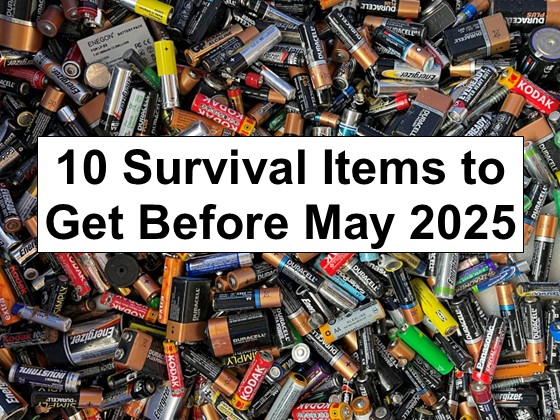I’d say this video is largely a rehash, though expanded, on the topic of tariffs and price increases from earlier this week regarding what to stockpile now while prices are still low. Watch the video and then I’ll share my comments below.
Largely, the advice centers around the following supplies:
- personal hygiene products
- generic medications & first aid supplies
- electronics & accessories
- vehicle parts & maintenance supplies
- durable clothing & footwear
- household cleaning supplies
- consumable tools & hardware
- shelf stable food staples
- power backup & energy resilience gear
- light bulbs & home essentials
Of these supplies, I suggest the first two, hygiene supplies and medications / first aid supplies, are crucial to keep up with no matter what’s happening in the world because they’re what keep up healthy. Thankfully, nearly everything you can purchase in these two categories will stay viable for years, even medications, if stored in a cool, dry place. I rarely see the prices for these items go down, so it’s wise to stock up as a hedge against inflation.
Regarding the electronics, he’s probably right that they’re going to see price hikes, but I would be careful about outright purchasing anything unless truly needed because, although useful during short-term disasters, aren’t directly related to your survival needs. Perhaps the only exception would be batteries of all kinds … stock up on those.
Vehicle supplies are likely going to be high hard, too, so it’s wise to stock up on basic maintenance items (oil, filters, plugs, etc.) if you’re into doing your own repairs.
Item five, durable clothing and footwear, are largely manufactured overseas, too, so expect these to get more expensive. Now’s the time to gather these items if you need to replace them. It’s also the right time to look for winter clothing on deep discount at thrift stores.
As for household cleaning supplies, I suggest learning now to make these yourself. It will be cheaper regardless of what happens with the tariffs, and probably healthier too. Look up recipes online and you’ll find a lot of ideas for general cleaners, bathroom sprays, laundry detergent, and so on. I’ve made these in the past with varying success. At minimum, find recipes you like and stock up on the base ingredients, like white vinegar, baking, soda, borax, and epsom salts. I wrote about it years ago.
I completely agree about stockpile tools and hardware, like nails, screws, tapes, caulking, and so on. These are rather difficult to find alternatives, if not impossible, and do a lot around the house. Even if you’re not worried about higher prices over time, being able to make expedient repairs after a storm strikes is always wise.
Part eight is about shelf-stable food. Rice, oats, pasta, flour, canned goods, cooking oils, and more may get more expensive for a variety of reasons. And would you know it, I wrote a book about the topic of the best foods to stockpile. Even better? I recently revised the book to include a lot more details you’re going to want to know.
Power backups, solar panels, generators, and related equipment, is always good to have. I think we all know that as preppers. The problem is that it’s almost all manufactured overseas, and I suspect these products are going to see some significant price hikes.
The final category, lightbulbs and home essentials (the video lists: extension cords, air and water filters, smoke detector batteries, surge protectors, simple replacement parts), may get more expensive as well, but I don’t think I would spend much money or time on these items unless you know you need something now.
Look, this isn’t entirely about very specific items that may or may not go up in price. If you’re a prepper, then you already know how important many of the above listed items are for your survival and day-to-day needs. At the very least, you understand that most of the items listed are consumables, which means we could face shortages due to tariffs, and the last thing you want is to be scrambling for items that you could get now, probably at lower prices, when you already know what to do. You think ahead of the masses. And you, as a prepper, choose to take action before shit happens.

Leave a Reply